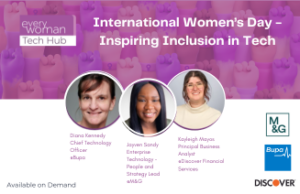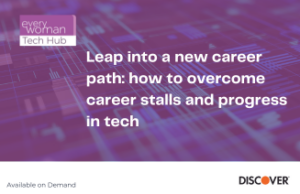
Returning to work after maternity leave is a daunting prospect for any new mum, but for QVC’s IT Project Manager Danielle Baker it was made even more challenging by the pandemic. We talk to her about her experience as a ‘lockdown working mum’ and how flexible working resulting from ‘pandemic reset’ could be one of the best ways to help talent retention in the industry.
Why did you decide to go into tech as a career and have you experienced any barriers as a woman?
I enjoyed IT lessons at school so it seemed natural to carry on with it at college — although there were only four girls in my class of 30. I quickly figured out this was a male-dominated area and though I found this a bit daunting, it didn’t put me off pursuing IT as a career. After college, I went on to university to do a BA in Computer Science — again, there were only 14 girls out of 200 students in the year. Having become used to this imbalance at college, it didn’t really faze me at university; that was ‘just the way it was’ and I also assumed it would be like that when I got a job. It’s interesting that this is the default mindset we still fall into as women.
How can business culture help set supportive foundations for more women in tech?
As soon as I walked through the doors for my initial interview at QVC I felt at ease, which has a lot to do with the culture here. There is no expectation to be ‘a certain way’ and that kind of implicit support is really valuable. I initially started as an assistant engineer but after a few months I realised it wasn’t really for me as it was a very technical role. QVC was supportive about helping me find my place, to discover what really interested me and where I could really use my skills. This turned out to be IT project management.
What were your biggest concerns around combining motherhood and a career?
I hadn’t been in the company long when I found out I was pregnant in 2019. I remember wondering if I was going to lose my job at first. Then I started questioning how I was going to pay my bills while on maternity pay, and how long I could realistically take off work once the baby came along. I earn slightly more than my partner, so we even discussed the possibility of me not taking any leave at all. It’s stressful enough trying to work that out when you’re pregnant, but to add to that, I was also really poorly with hyperemesis gravidarum; up to 26 weeks pregnant I was in and out of hospital. I could only work from home, which QVC was really supportive of, then when the sickness started settling down, I went back into the office two days a week and worked up until 37 weeks.
Did you have any expectations around returning to work?
I watched my mum work full-time and run businesses with three kids on her own, so I knew it would be hard, but I knew I’d be able to do it. My partner is really supportive, as are our families, which makes all the difference in how well I’m able to cope with both sets of demands. When planning my mat leave, I was quite open with my manager and asked if I could have work two days a week at home after the baby was born — and be flexible with my hours as well. My original plan was always to put my daughter in nursery two days a week, with my partner’s parents covering two days a week and then spend one day at home with her and see how it went. If it didn’t work, I reasoned, then I would just have to put her in nursery for another day — but obviously, I didn’t realise then how much nurseries cost!
What was it like returning to work from maternity leave during a pandemic?
My daughter was four weeks old when the pandemic started and I went back to work after nine months, working full-time from home. At that time, everyone was working from home, but as I hadn’t kept in contact with anyone during my maternity leave I really didn’t know what to expect, especially in this new situation. My manager was very supportive in helping me get up to speed and as a global company we were already used to working on Teams, so that was nothing new to me. When I first came back though, I really struggled around switching off, because I felt I should be working all the time. When my daughter was asleep, I’d be back in the room checking my emails and it was my boss who eventually said, ‘You’ve got to stop doing that!’. Although working full-time from home wasn’t my original plan, it has actually made things a lot easier overall. I don’t have an hour-each-way commute on top of everything else, which is great. Although [on the downside] I still haven’t actually seen anyone in the office in person since going on maternity leave!
What impact has motherhood had on your career at such an early stage?
I’ve been with QVC for four years now and even in that amount of time technology has changed so much — and it continues to change, which excites me, especially as someone at the beginning of her career. The potential impact of taking maternity leave on my career worried me and I wondered if it would stop me from progressing as quickly as I wanted to. But since I’ve been back, my career hasn’t stopped; I’ve more work and more responsibilities than I had before. A typical day involves checking emails, hosting meetings, working to get the team engaged and managing finances. Basically, sorting out the big questions: what do we need to do to do this? And is there anything that’s blocking us from achieving this by this date? If anything, being a mum has made me more confident in so many ways — I’m dealing with something else in my life that’s also really important to me now, and I’ve got a lot to get done when I am at work, so I haven’t got time to stress.
What can tech companies do to retain more female talent after motherhood?
For me, flexible working is key to retention for mothers. The pandemic has changed expectations and made it a lot easier to ask for that flexibility. The nine-to-five just doesn’t work when you’ve got to fit children around that — and especially if you haven’t the family support. If companies really want to support their employees they need to be aware that everyone’s circumstances are individual — we’re all working within unique situations. It’s especially important in a male-dominated area like tech — the more support we show working mums, the more good work they can do for their organisations.



